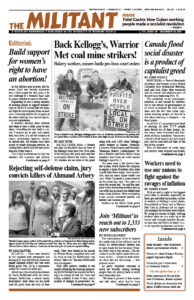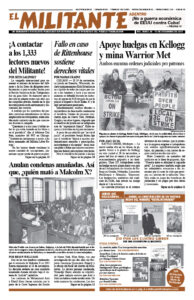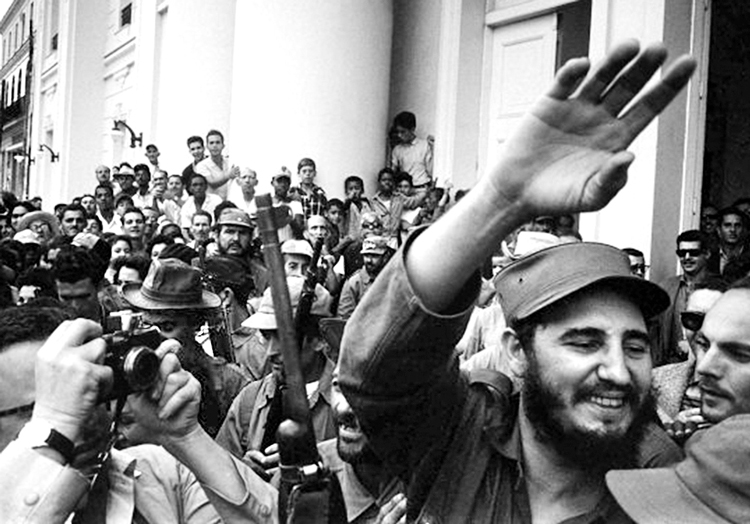U.S. imperialism will never forgive working people in Cuba for overthrowing the U.S.-backed dictatorship of Fulgencio Batista, replacing capitalist rule with a government of workers and farmers, nationalizing U.S. and Cuban companies and opening the first socialist revolution in the Americas.
That revolution was a product of the operations of capitalism, but it could not have charted a path to victory without the political leadership of Fidel Castro. The U.S. rulers hoped when he died Nov. 25, 2016, the revolution would die with him. But five years later, his ideas and example are looked to by millions in Cuba who continue to defend their conquests.
For more than 62 years the U.S. rulers have tried to destroy the socialist revolution. They organized a mercenary invasion at the Bay of Pigs (Playa Girón) in 1961; planned hundreds of attempts to assassinate Castro; and maintain a cruel economic, financial and trade embargo.
The revolutionary struggle opened after a coup by Batista, when a vanguard of men and women came together determined to oppose the dictatorship at all costs. Led by Castro, they organized an attack on the Moncada Barracks in Santiago July 26, 1953. It was defeated and Castro was put on trial.
His speech to the court was smuggled out of prison and tens of thousands of copies distributed. Known as “History Will Absolve Me,” it became the program of the July 26 Movement for a revolutionary struggle to win land for peasants, end chronic unemployment and exploitation, and defend democratic rights.
Under the pressure of widespread calls for amnesty, Castro and other Moncada combatants were released from prison in May 1955. He went to Mexico, returning to Cuba aboard the yacht Granma with 81 revolutionaries Dec. 2, 1956. Despite a surprise assault by Batista’s troops after they landed, some 15 made it to the Sierra Maestra where they initiated a revolutionary war.
Che Guevara describes how members of the Rebel Army were transformed in the course of the struggle. “We were beginning to feel in our flesh and blood the need for an agrarian reform and for profound and integral changes in the social structure,” he said. In areas they liberated, the Rebel Army organized working people to take charge of education, land reform, health care and justice. By December 1958, they had defeated Batista’s army.
When Batista fled the country Jan. 1, some of his generals planned a coup to hold onto power. But millions responded to Castro’s call for a general strike that paralyzed the island. Castro planned to rapidly get to Havana.
But as his Rebel Army column headed there, “the people stopped me in the towns. I was not able to do anything else but speak with the people,” Castro said. Over the next week, during what became known as the Freedom Caravan, he gave speeches in town after town.
“The whole town is here today, because everyone is interested in the problems of Cuba,” Castro told those who greeted him in Santa Clara Jan. 6. “They know they will have the final word on all questions.”
After the conquest of power, Castro led a process of discussion and debate that culminated in his July 26 Movement, the student-based Revolutionary Directorate and the pro-Moscow Popular Socialist Party fused. It became the Communist Party of Cuba in 1965.
The excerpt below, from a speech Castro gave on March 26, 1964, describes the impact the Freedom Caravan had on him, the deep transformation in consciousness and confidence of workers and peasants and the building of a new communist leadership in Cuba.
It’s that transformation — and the example it sets for working people in the U.S. and around the world — that Washington fears. Translation is by the Militant. The speech is printed in La Revolución Cubana, published by Ediciones Era.
❖ ❖ ❖
I, too, belonged to an organization. But the glories of that organization are the glories of Cuba, they are the glories of the people, they belong to all of us. And there came a day that I stopped belonging to that organization. Which day? The day when we had made a revolution greater than our organization, the day we had a people with us, a movement far greater than our organization, near the end of the war, when we already had a victorious army that would become the army of the revolution and of all the people, at the time of the victory, when the entire people joined us and demonstrated their support, their sympathy, their strength.
And as we moved through towns and cities, I saw lots of men and women, hundreds and thousands of men and women with the red and black uniforms of the July 26 Movement. But many more thousands wore uniforms that weren’t black and red but were the work shirts of workers and farmers and other men and women of the people. And since that day, honestly, in my heart, I left the movement that we loved, under whose banners we had fought, and I joined the people. I belonged to the people, to the revolution, because we had truly accomplished something that was greater than ourselves.
In two words, gentlemen: we have made a revolution bigger than ourselves and we have to live up to the revolution we have made. And these glories belong to the people. All. And the martyrs belong to the people. And that movement is much bigger than any of us, and together we have done bigger things than we did in the respective organizations we came from; together we fight the imperialist enemy; together we are making the socialist revolution; we defeated the invaders at Girón; together all types of men have died in the same trenches and on the same lines; and together one day, with serenity, with firmness, with honor, with immortal courage, we were all ready to die during the October [1962 missile] crisis. …
There are many, especially our anonymous soldiers of the revolution, many anonymous combatants of the revolution, who were illiterate at the triumph of the revolution.
How many youth in the Rebel Army who could not read or write are already in junior high school, have already graduated from junior high school, now command battalions, divisions, armies, command artillery and tank brigades! How they have improved themselves, how they have grown, while others have remained stagnant! …
They are the strength, the backbone of the revolution! Fist, arm, muscle of the revolutionary people, of the working class, of the peasants, of the workers! …
We are making a revolution much bigger and, of course, much more important than ourselves; we are doing something that will withstand the test of time, will withstand all shocks, will withstand everything, which is enduring and eternal in time; that it’s not us ourselves, that we are nothing without the people, that we have no other strength than the strength of the people.


